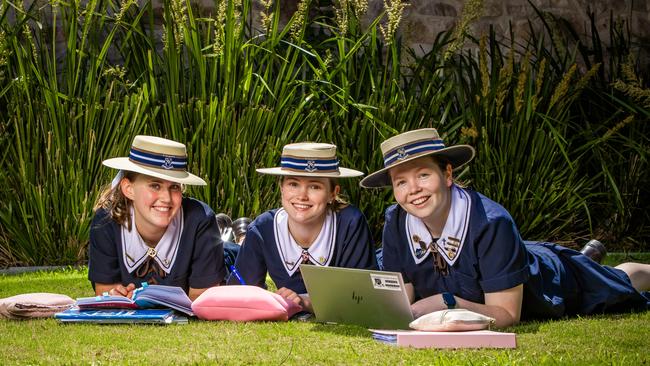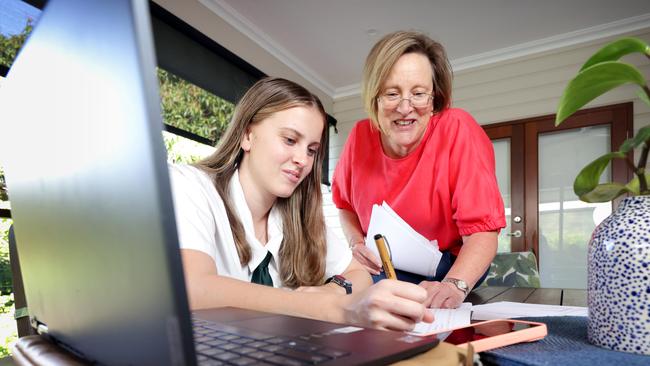Revealed: How to avoid fatigue and stress during grade 12 exams
School exams can be a stress but there is a very simple method to avoid fatigue.

Education
Don't miss out on the headlines from Education. Followed categories will be added to My News.
Experts and researchers have urged Queensland students to take breaks when studying to avoid fatigue during the external exam period in the wake of shocking data which shows 88 per cent of students have experienced study stress in the past 12 months.
The data released by ReachOut – a young people support service – also showed 61 per cent of students aged between 16 and 25 lacked motivation and 17 per cent said that study stress had a major impact on their wellbeing or their mental health.
And with over 40,000 students expected to begin their exams across the state from Monday according to QCAA, Time Management Expert Kate Christie described the numbers as “troubling” and said part of the solution to over stress and study fatigue was by taking regular breaks.
“Students are avoiding breaks because they’re just not sure how often they should take them and how long the study break window should be,” she said.
“Taking regular breaks is absolutely essential for deep learning to fuel productivity and having proper breaks is key to improving concentration, enabling retention and good for overall well being. The research tells us that regular breaks allows your brain not only to rest and recharge, but it compresses and consolidates the information it’s just taken in.”

When it came to managing time with study during the external exams, Ms Christie recommended the “pomodoro study technique” for year 12s.
“The best way for them to do it (study) is to mirror a school day. So they can replicate that by studying for about 25 to 30 minutes and then take a five minute break and then repeat that process for about four rounds of 25 minutes study with a five minute break, and at the end of the fourth round, have a longer break of about 20 or 30 minutes.”
Brisbane Mother Katrina Maguire said her year 12 daughter Amy’s main technique was staying organised ahead of her exams.
“We monitor how she’s going, and if she’s a bit anxious, I check in. But, you know, she likes to eat well, so we make sure we’ve got everything she needs in the fridge and all those kind of things,” she said.
Ms Maguire said she mainly played a “supportive role” for Amy.
“She knows we’re here and if she needs us for anything, she’s just got to ask and we’ll be available.”
“I remind the family just to tread carefully when she is studying and to give her a bit of leeway if she’s a bit anxious or over the top.”
Amy described the lead up to her exams starting with English on Monday as both “stressful and exciting”
“I want to do well and worry that I won’t but I know I’ve worked really hard all year so hopefully that will help,” she said.
Amy said the main form of study she used was making handwritten note cards for revision.
“When I get sick of study I take our dog Archie for a walk or catch up with my friends.”
ReachOut’s Clinical Lead Linda Williams gave her advice for parents on how best they could support their child.
“It's actually really important for parents to look after themselves too, you know, its somewhat of a cliche phrase now but fitting your own oxygen mask before you fit someone else's,” she said.
“Regular check ins and communication, now that doesn’t have to mean a deep and meaningful conversation because sometimes teens aren’t always in the right space to want to do that but even just a quick check in when you’re maybe driving them somewhere in the car,” she said.
Ms Williams said promoting health habits like regular exercise and meals were also important.
“In the week exams are happening, parents should also probably be a bit lenient when it comes to, perhaps tidiness or chores and going ‘okay well right now it might be more about asking how I can help them to make them feel supported,’” she said.
Ms Williams said anxiety, worry and stress were all common prior to exams.
QCAA Chief Executive Officer Jacqueline Wilton reminded students exams were just one of the ways students are assessed in the QCE system.
“While some students may feel nervous, we know that schools and teachers do a wonderful job preparing them for their QCE and their exams,” she said.
“As well as covering the course material in class, students will have sat past papers and reviewed subject syllabuses so they know what will be tested, the format of the assessments and recommended response length.”
Ms Wilton said the myQCE website had lots of tips and advice to help students embrace study in a positive way and said “balance is important”.
“It also includes information to help them look after their physical and mental health, with trusted sources of support should they feel anxious,” she said.
“It’s wise to put away mobile phones when studying, take regular breaks, maintain time for socialising, eat well and get plenty of sleep.”
TOP 10 GENERAL SUBJECTS BY ENROLMENT IN QUEENSLAND
English: 27 428
General mathematics: 20 633
Biology: 13 894
Mathematical Methods: 11 579
Chemistry: 8 793
Physics: 7 495
Physical Education: 5 591
Literature: 5 470
Modern History: 5 429
Psychology: 5 291



